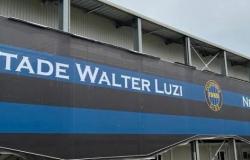The battle for control of the maritime line linking Tarifa-Tangier, in Morocco, has gained considerable momentum in recent months, fueled by fierce competition between two giants of the Spanish maritime sector: Baleària and FRS Iberia Maroc.
This line, which is much more than a simple connection between Andalusia and the north of Morocco, it represents a major strategic issue both economically and politically, especially since the maritime transport sector between Spain and Morocco is particularly vital for thousands of passengers each year, particularly during Operation Marhaba which sees a major influx of Moroccans from abroad.
Hundreds of thousands of passengers use this strategic line each year, particularly during the summer and on the occasion of religious holidays, which explains the intensity of competition between the two Spanish companies.
Likewise, this line is seen as a key element in the preparation for the 2030 Football World Cup, which will be held in Spain, Portugal and Morocco. This global sporting event could explode attendance on this line and further increase competitiveness between operators.
The process of buying the line took the form of a call for tenders in which Baleària and FRS Iberia Maroc engaged in a real commercial battle to win this strategic contract. According to information reported by Europa Sur, Baleària seems to have taken a slight advantage after the evaluation of the economic and technical offers.
The Spanish company won two of the three sections of the competition, those relating to objective criteria, notably the technical and financial aspects. However, the competition is not over, and a final, more subjective criterion is still at stake, that of the operation of the line.
Baleària, whose experience in the sector is well established, presented an offer described as “the most sustainable and innovative”, proposing an investment of 135 million euros for the construction of two fast electric ferries.
These new ships, with no polluting emissions, will have a capacity of 800 passengers each, and will mark a significant step forward in terms of respect for the environment and modernization of the fleet.
Baleària’s proposal includes emission-free electric ferries, which meets the increasingly strict environmental standards of the European Union and Morocco. For its part, FRS Iberia Maroc, well established in the market, is not being left behind. Although Baleària seems to have taken a slight lead, highlighting its strengths in terms of customer service and operational management.
The final choice of the future operator of the Tarifa-Tangier line could therefore be based on more subjective elements, such as timetable management, operational efficiency or even quality of service. These criteria, although less tangible than the economic and technical aspects, play a determining role in the choice of a shipping company for such a strategic line.
Beyond the economic issues, the challenge for the two shipping companies is also to contribute to the consolidation of this strategic link between Europe and Africa, by setting up a modern and reliable infrastructure.






